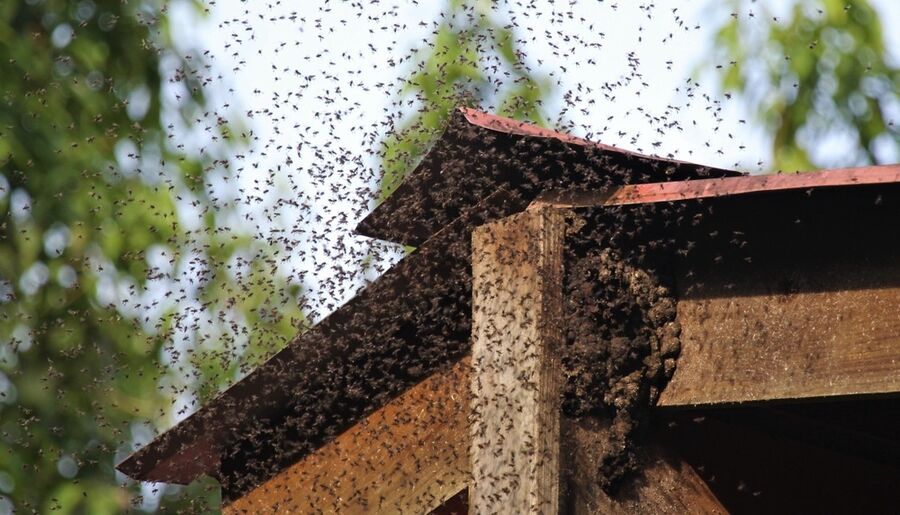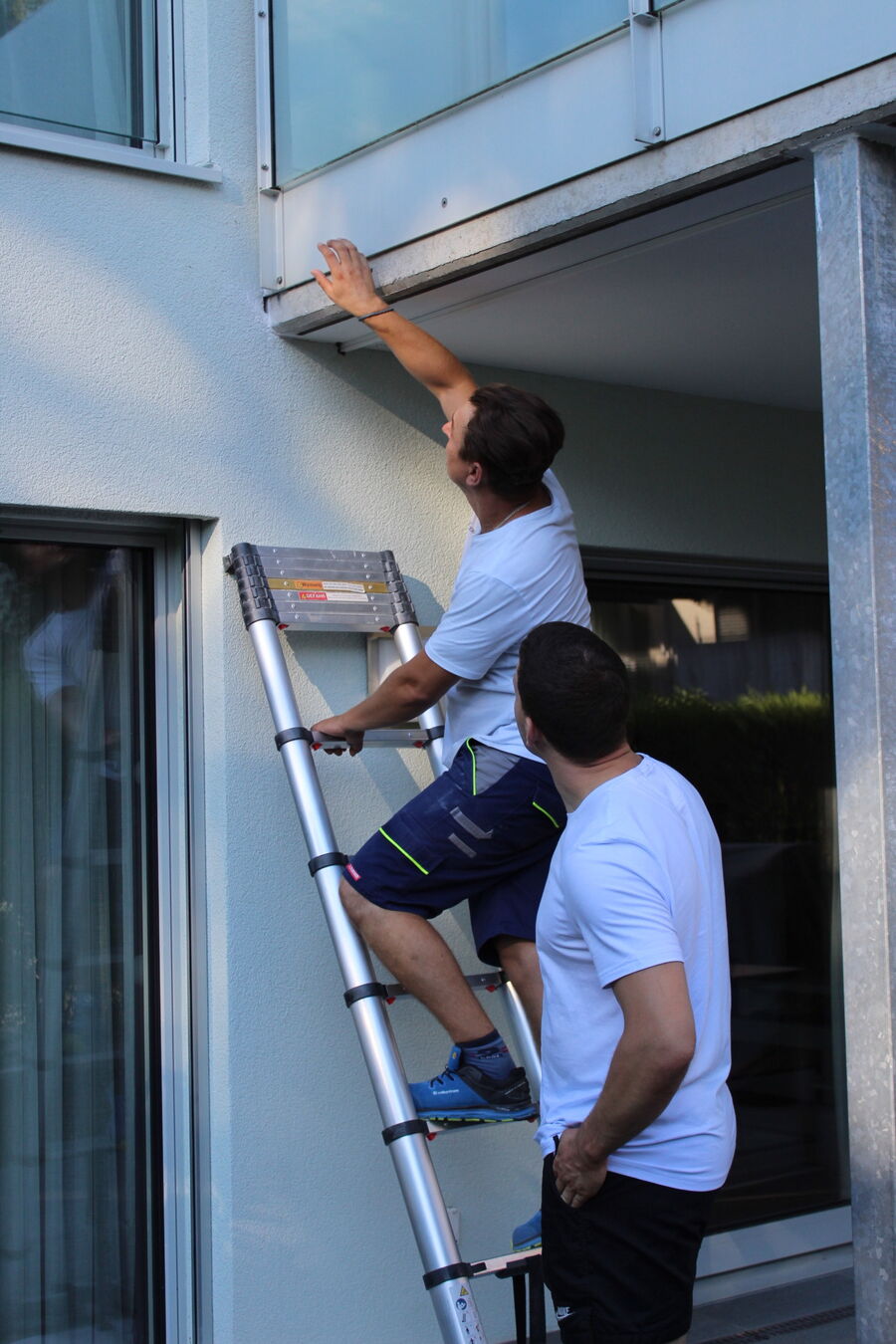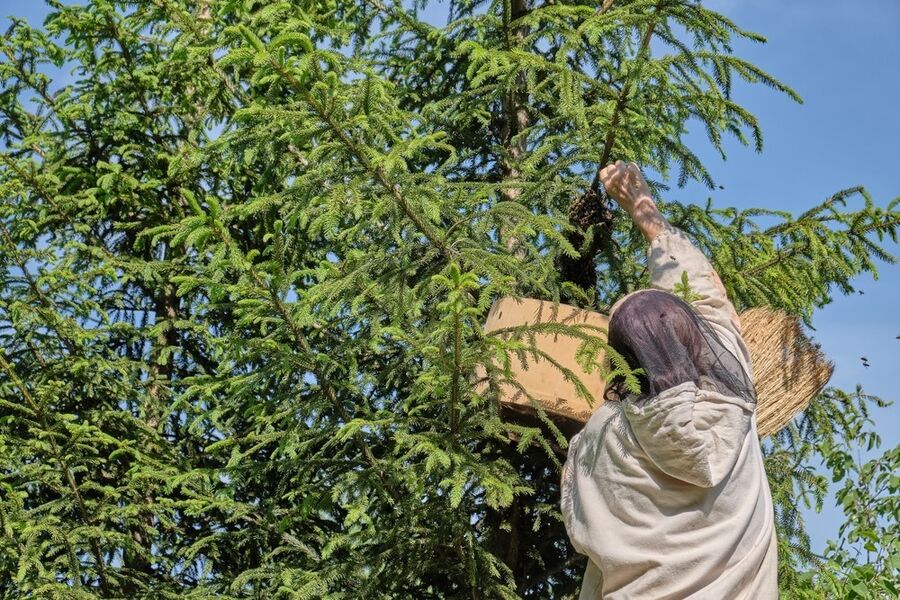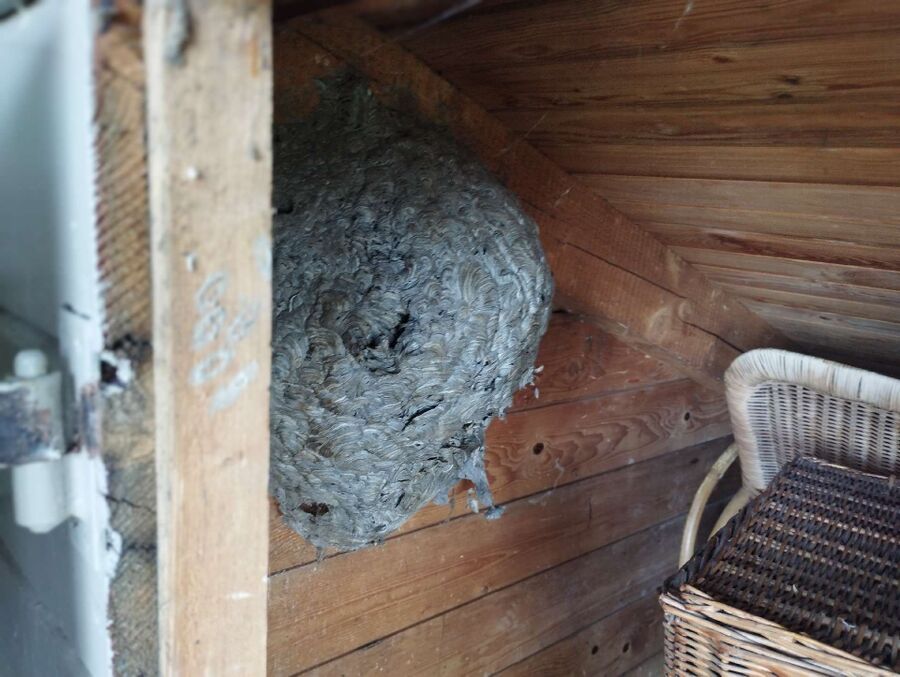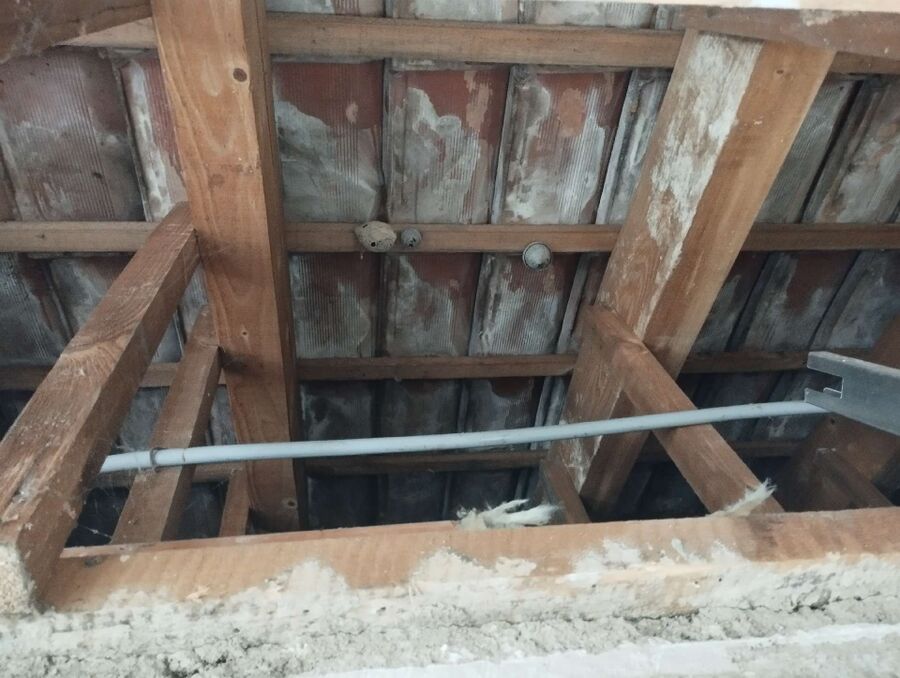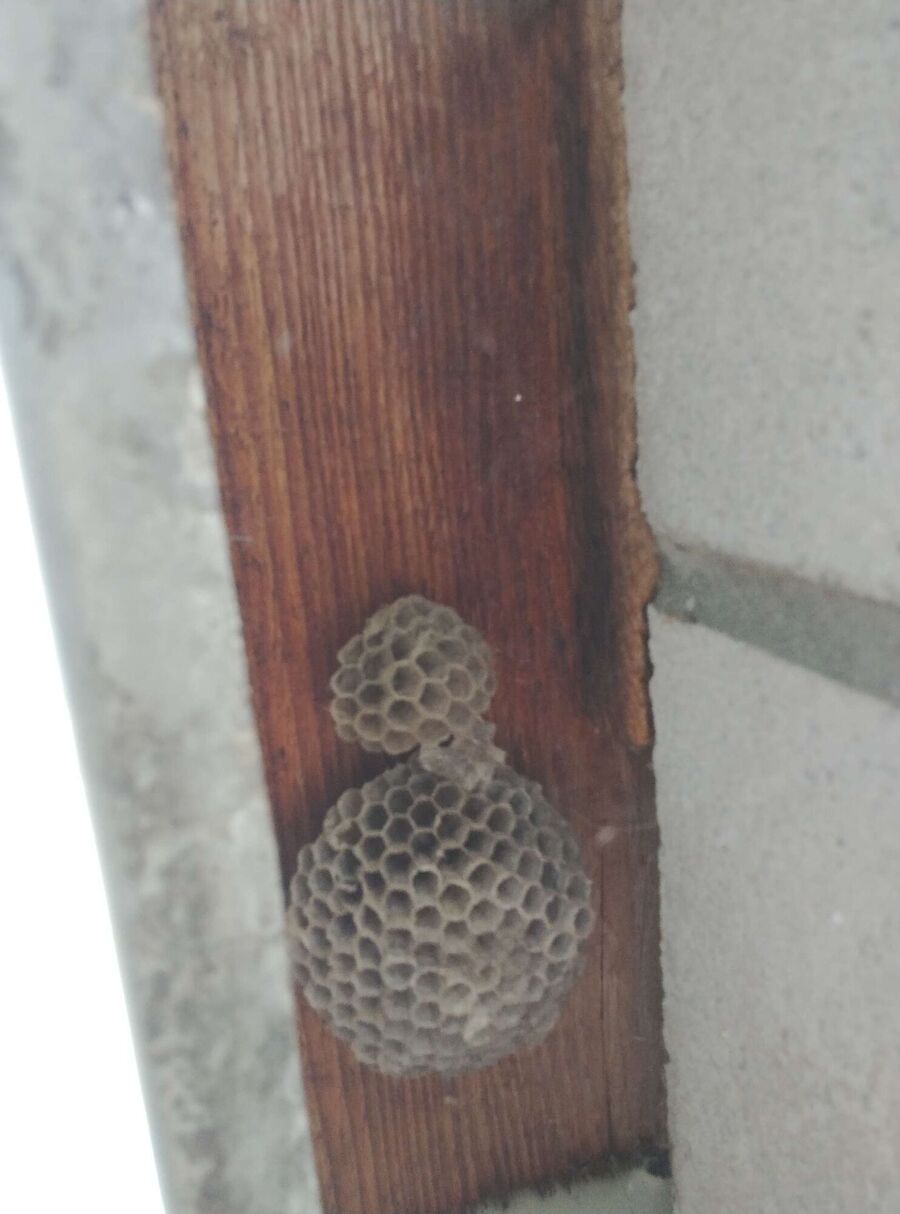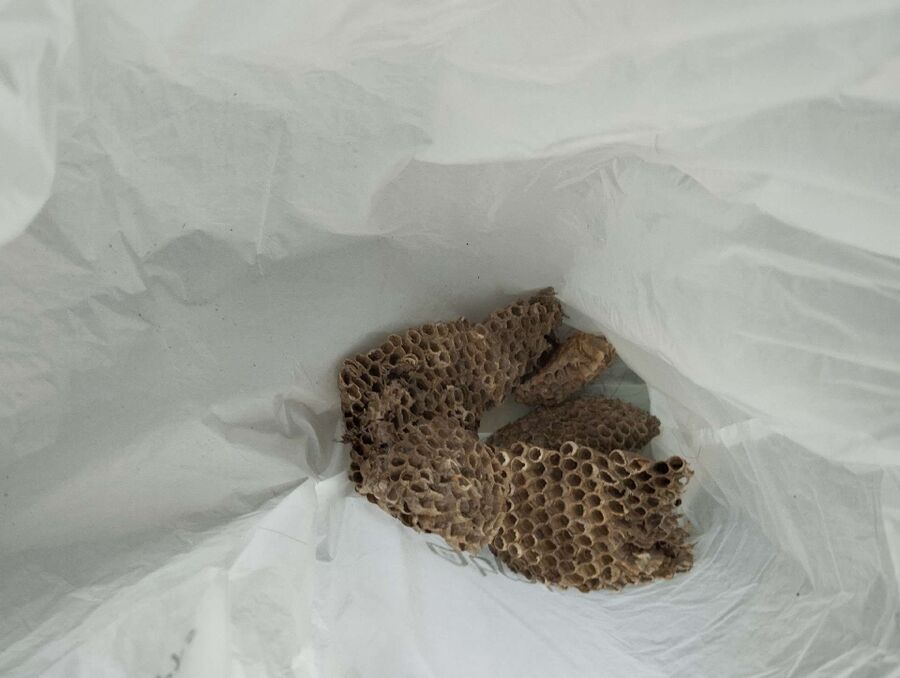Relocate bees &
Remove bee nest in DELETE
Call now! 058 510 22 54
Have the bees' nest professionally removed in DELETE
Bees are fascinating and essential creatures for our ecosystem. There are over 20,000 species of bees worldwide, and they vary in size, color and behavior. In Bees are vital pollinators and central to our ecosystem. They enhance biodiversity and are needed for the pollination of many food plants. In gardens, bees are often valued for their benefits to flowers, vegetables, and fruits. Nevertheless, bees found on or inside the house can be a concern. A single bee in the garden shed is generally harmless, but a hive in or on the house can be challenging.
Make an appointment: 058 510 22 54
Honey bee & wild bee- What is the difference?
Bees are fascinating insects that can be divided into different species, mainly honey bees and wild bees.
The honey bee, scientifically known as Apis mellifera, is the best-known bee species. They live in large, socially organized colonies consisting of a queen, many workers and a few drones. Honey bees are famous for their ability to produce honey and play an important role in agricultural pollination. They are generally less aggressive and tend to live close to human settlements.
Wild bees, on the other hand, are a diverse group comprising thousands of species. Many wild bee species are solitary, meaning that each individual bee builds and manages its own nest area. Wild bees generally do not produce honey, but are efficient pollinators for many wild and cultivated plants. They vary greatly in size, color and behavior and are often adapted to specific environments or plant species.

The honey bee, known as Apis mellifera, lives in social colonies and is famous for its honey production. They are important pollinators in agriculture and nature. Honey bees are recognizable by their distinctive appearance and complex behavior, including communication through the bee dance. They are generally peaceful, but can sting in defense of their hive.

Wool bees, also known as Anthidium, are solitary wild bees that line their nests with plant fibers. They are small to medium sized, colorful with different patterns and effective pollinators, which are particularly active in summer. These bees are peaceful and only sting in self-defense, being important players in the ecosystem.

Sand bees, part of the genus Andrena, are solitary wild bees that nest in sandy soils. Each female builds her own underground nest with several brood chambers. They are important pollinators in spring, non-aggressive and contribute significantly to biodiversity. Their small size and inconspicuous appearance make them less well-known than other bee species.

Bumblebees, known as Bombus, are furry, large bees that live in small colonies. They are excellent pollinators, especially in cooler climates and for plants with deeper flowers. Bumblebees are generally peaceful and only sting in self-defense. Their adaptability makes them an important part of the ecosystem.
Have bees relocated by an expert in DELETE
As professional pest controllers, we specialize in the removal of bee nests and the relocation of bees in DELETE. Bee removal or relocation becomes necessary when bees endanger humans or settle in undesirable areas. Our clients often contact us for help with bee removal or relocation, ensuring the bees receive a safe and eco-positive new habitat. Using advanced methods, we relocate the bees safely and effectively, always keeping their welfare and ecological importance in mind. With our expertise, we guarantee a responsible and sustainable solution for bee relocations from the exterminator in DELETE.
24 hour emergency service
Do you need help IMMEDIATELY? Call now 058 510 22 54
100% discretion in use
Out of discretion, we refrain from any advertising imprints.
Fast and effective
As professional pest controllers, we specialize in bees.
Certified employees
Our employees are certified by the VSS .
Current news about bees
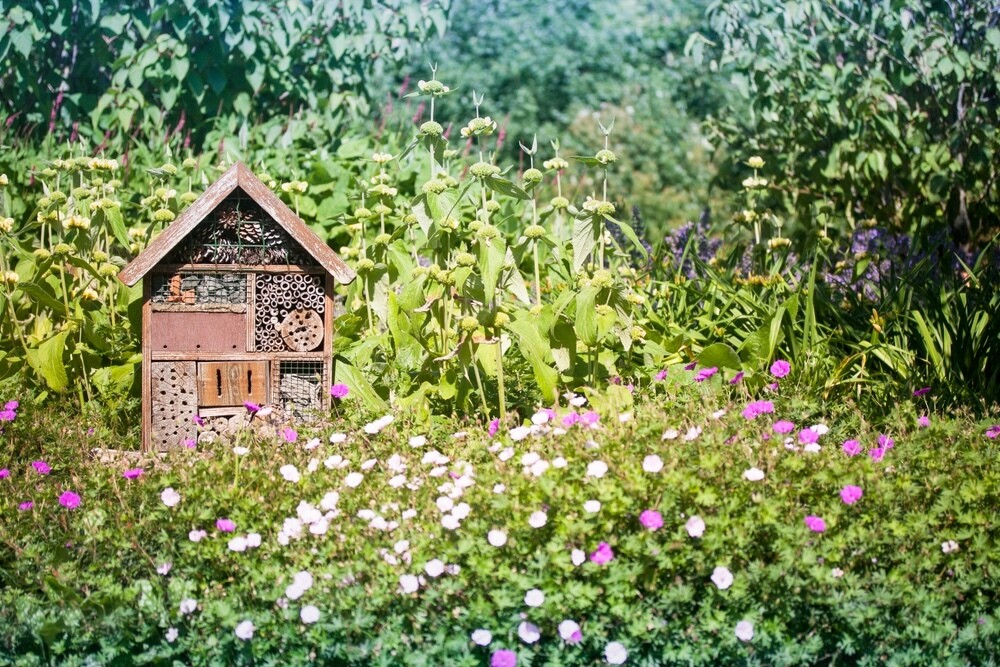
02.12.2025 Wild bees in the garden
Wild bees contribute significantly to garden biodiversity and are crucial for effective plant pollination. By choosing bee-friendly plants and providing appropriate nesting habitats, garden owners can actively help protect these vital pollinators. Our bee experts are available to offer guidance on how to design a garden that attracts and supports wild bee populations.Buy a wild bee hotel
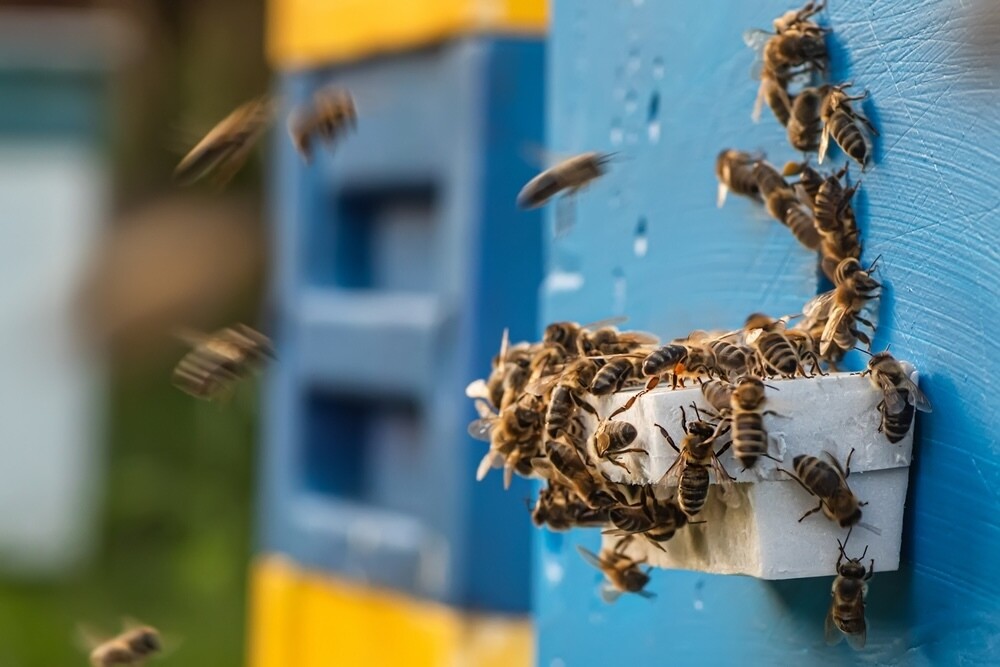
25.11.2025 Asian hornet dangerous?
The Asian hornet represents a serious danger to bee populations, especially honey bees, which it deliberately hunts. Its aggressive behavior disrupts the bees' natural activities, resulting in a marked reduction in pollination. To curb its expansion, specific monitoring and control measures are being carried out in impacted areas.
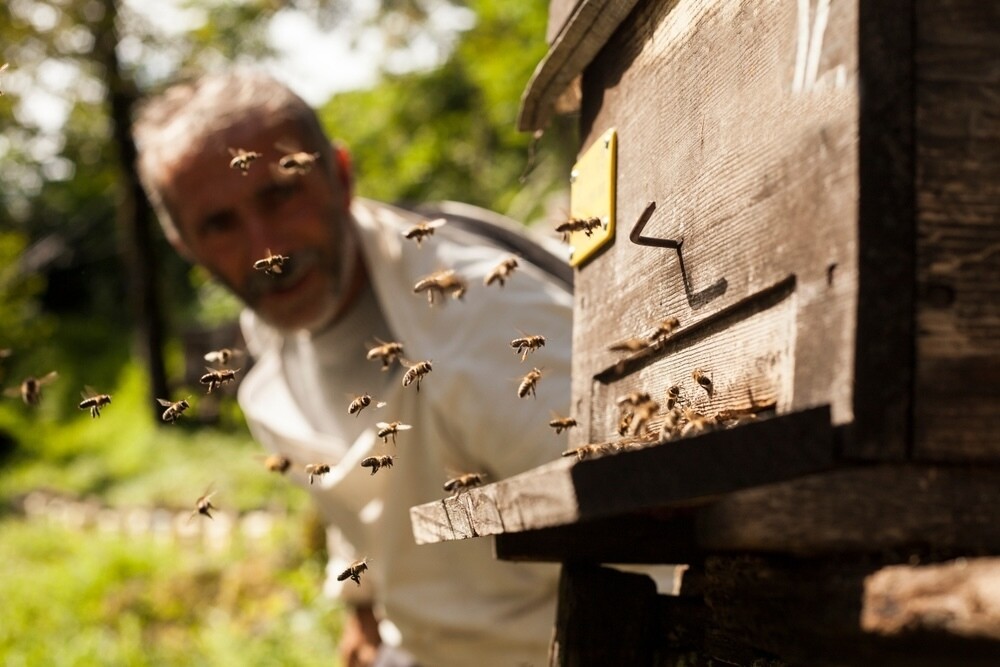
18.11.2025 Relocate bees correctly
To ensure a safe bee relocation, the involvement of a skilled professional is crucial. It's important to take appropriate measures to safeguard both the bees and people nearby, minimizing stress on the colony and reducing the chance of stings. The new location should be thoughtfully chosen, offering sufficient food sources and protection from the elements.

11.11.2025 Insect protection in Switzerland
Switzerland supports insect conservation through various initiatives aimed at preserving natural habitats and reducing pesticide usage. These actions help sustain insect diversity—particularly bee species essential for pollination—and contribute significantly to long-term ecological sustainability. For more information, visit: Insects-Switzerland
Protection for humans & bees
The process of moving bees in Switzerland is both significant and sensitive. Our accredited professionals are trained to ensure the safety of humans and the well-being of bees. When relocating bees to DELETE we make sure to follow the latest ecological guidelines and methods. Through training, we ensure that every step of the bee nest relocation process is based on current best practices, ensuring a responsible approach to our environment and the bees in DELETE.
You can reach us by phone at 058 510 22 54 or make an uncomplicated appointment request via our contact form to have bees removed or relocated We are flexible and will come to you quickly even in an emergency.
Bees around the house & in the garden - Dangerous or useful?
As key pollinators, bees play a crucial role in our ecosystem. They help boost biodiversity and are essential for the pollination of many plants we use for food. In gardens, bees are generally appreciated for their support of flowers, vegetables, and fruits. Yet, bees found on or in the house can be troublesome. A lone bee in a garden shed is usually safe, but a hive in or on the house can be a challenge. It is important to know that bees can sting, especially if they feel threatened. If you have discovered bees on your house and would like to have the bee nest removed, please contact us immediately. You should not remove a beehive yourself.
Professional pest controllers and beekeepers can relocate bees safely and effectively without harming them. As experts, we understand bee behavior and can take appropriate action to remove the bee nest and move it to a more suitable location where it can continue to play an important role in the ecosystem. By handling bees properly, we contribute to the conservation of these important insects and the health of our environment.
If you have discovered bees in your house or garden, do not hesitate to contact us. We are your experts for bee removal in DELETE. Make an appointment and we'll take care of the rest. - Call us now! 058 510 22 54
Frequently asked questions & answers about bees in DELETE
Large, well-organized colonies are typical of honey bees, who are known for their honey-making skills. Wild bees, however, are generally solitary and do not produce honeHoney bees live in extensive colonies with meticulous organization and are noted for their honey. Wild bees, however, are generally solitary and do not produce honey, and they show more variety in appearance, size, and behavior.Large, well-structured colonies are typical for honey bees, who are famous for their honey production. Wild bees, in contrast, are primarily solitary and do not create honey, showing a greater range of diversity in appearance, size, and behavior.Honey bees, who are known for producing honey, live in extensive, well-organized colonies. Wild bees, however, are mostly solitary and do not make honey, and they display greater diversity in appearance, size, and behavior.Honey bees live in large, well-coordinated colonies and are known for their honey-making abilities. Wild bees, however, are generally solitary and do not create honey, and they exhibit more diversity in their appearance, size, and behaviors.Honey bees are renowned for their honey and inhabit large, well-ordered colonies. Wild bees, however, are mostly solitary and do not produce honey, showing more variation in appearance, size, and behavior.While honey bees are famous for their honey and live in large, well-organized colonies, wild bees are generally solitary and do not make honey. Wild bees also demonstrate greater diversity in their appearance, size, and behavior.Honey bees are celebrated for their honey production and live in large, well-structured colonies. Wild bees, however, are mostly solitary and do not produce honey, and they show more variation in appearance, size, and behavior compared to honey bees.Honey bees thrive in large, orderly colonies and are noted for producing honey. Wild bees, in contrast, are generally solitary and do not make honey, and they exhibit more diversity in their appearance, size, and behavior.Known for their honey-making abilities, honey bees live in extensive, well-coordinated colonies. Wild bees, however, are mostly solitary and do not produce honey, and they show a greater diversity in appearance, size, and behavior.Honey bees are distinguished by their honey production and inhabit large, well-arranged colonies. Wild bees, however, tend to be solitary and do not make honey, displaying more variation in appearance, size, and behavior.Honey bees live in large, intricately organized colonies and are famous for their honey. Wild bees, however, are generally solitary and do not create honey, and they present a broader range of diversity in appearance, size, and behavior.Honey bees are well-known for making honey and reside in large, well-structured colonies. Wild bees, on the other hand, are mostly solitary and do not produce honey, and they exhibit more diversity in their appearance, size, and behaviors.Honey bees, who live in large, well-organized colonies, are renowned for honey production. Wild bees, in contrast, are primarily solitary and do not create honey, showing more variation in appearance, size, and behavior.Honey bees live in extensive colonies with careful organization and are known for their honey. Wild bees, however, are generally solitary and do not produce honey, and they display more diversity in their appearance, size, and behaviors.Honey bees thrive in large, well-coordinated colonies and are noted for their honey production. Wild bees, in contrast, are mostly solitary and do not create honey, and they show a greater range of diversity in appearance, size, and behavior.y, and they exhibit more variation in appearance, size, and behavior.
Bees’ pollination abilities ensure the successful reproduction of various plants, including agricultural crops, and are crucial for the health of ecosystems and the preservation of biodiversity.The reproduction of many plants, including those used for food, is supported by bees through their pollination work, which is essential for ecosystem health and biodiversity.Bees help facilitate the reproduction of numerous plant species, including crops, by pollinating them, and are key to maintaining biodiversity and ecosystem stability.Through their pollination efforts, bees assist in the reproduction of a wide range of plants, including crops, and are vital for preserving biodiversity and the health of ecosystems.The pollination provided by bees is essential for the effective reproduction of many plants, including agricultural crops, and plays a significant role in sustaining biodiversity and ecosystem health.Bees are crucial for pollinating plants, which supports the reproduction of numerous species, including crops, and is vital for maintaining biodiversity and ecosystem balance.Thanks to their role in pollination, bees help various plants, including crops, reproduce effectively and play a critical part in maintaining ecosystem health and biodiversity.Bees enhance the reproduction of various plant species, including those used in farming, through their pollination activities, and are crucial for preserving biodiversity and ecosystem stability.The ability of bees to pollinate plants supports the effective reproduction of many species, including crops, and is essential for maintaining biodiversity and ecosystem health.By aiding in the pollination process, bees ensure the successful reproduction of numerous plants, including agricultural crops, and are vital for upholding biodiversity and ecosystem balance.Bees play an indispensable role in pollination, which supports the reproduction of various plants, including crops, and is critical for preserving biodiversity and ecosystem integrity.Through their pollination efforts, bees help a wide range of plants, including those we grow for food, reproduce successfully and are essential for maintaining ecosystem health and biodiversity.Bees contribute to the reproduction of many plant species, including crops, by pollinating them, and are vital for the health of ecosystems and the preservation of biodiversity.The effective reproduction of numerous plants, including crops, is facilitated by bees through their pollination work, which is crucial for maintaining biodiversity and ecosystem stability.Bees are essential pollinators that boost the reproduction of various plants, including crops, and play a significant role in sustaining biodiversity and ecosystem health.Thanks to their pollination abilities, bees help many plant species, including agricultural crops, reproduce effectively and are fundamental in preserving biodiversity and ecosystems. Contact us if you would like to relocate bees or have a bee nest removed. 058 510 22 54
When bees are left undisturbed in the garden and their nests are not bothered, they are usually harmless. They generally sting in self-defense. For relocation, contact an exterminator or beekeeper.Bees are generally safe if their nests are not interfered with and they are left alone. They typically sting only in self-defense when threatened. Relocation can be handled by a beekeeper or pest control expert.If bees in the garden are not disturbed and their nests remain undisturbed, they are generally harmless. They usually sting only in self-defense. An exterminator or beekeeper can assist with their relocation.Bees usually pose no harm if their nests are left alone and they are not disturbed in the garden. They typically sting only when they are threatened. A beekeeper or pest control professional can relocate them.As long as bees in the garden are left undisturbed and their nests are not interfered with, they are generally harmless. They tend to sting in self-defense when threatened. Relocation can be managed by a beekeeper or exterminator.Bees are typically harmless if their nests are not disturbed and they are left alone in the garden. They usually sting only when they feel threatened. An exterminator or beekeeper can help relocate them.If bees’ nests are undisturbed and they are left alone, they are usually harmless. They sting mainly when threatened. For relocation, consult an exterminator or beekeeper.Bees in the garden are generally harmless if their nests are not disturbed. They usually sting only when they feel threatened. An exterminator or beekeeper can assist with relocating them.As long as bees are not disturbed and their nests are left alone, they are generally safe. They generally sting in self-defense. Relocation services can be provided by a beekeeper or exterminator.Bees are usually harmless if their nests are undisturbed and they are not provoked. They typically sting only when they feel threatened. An exterminator or beekeeper can manage relocation.Provided their nests are not disturbed and they are left alone, bees are generally harmless. They usually sting mainly in self-defense. An exterminator or beekeeper can help with relocation.If bees are left alone and their nests are not disturbed, they are usually non-threatening. They generally sting only when threatened. For relocation, contact a beekeeper or exterminator.Bees will remain harmless if their nests are left alone and they are not disturbed. They typically sting only in self-defense. An exterminator or beekeeper can assist with relocation.As long as their nests are undisturbed and they are not provoked, bees are typically harmless. They generally sting only when they feel threatened. For relocation, you can consult an exterminator or beekeeper.Bees are generally harmless if their nests are not disturbed and they are left alone. They usually sting mainly when threatened. An exterminator or beekeeper can handle relocation.Provided bees are not interfered with and their nests are undisturbed, they are generally safe. They usually sting only when threatened. Relocation can be arranged by an exterminator or beekeeper. Bees in the garden can also be relocated by an exterminator like us, or a beekeeper.
For a beehive on your house, hiring professionals for relocation is advisable. DIY methods can be risky. Experts will ensure the bees are relocated safely, protecting both humans and animaIf there is a beehive on your property, it’s best to get professional help for relocation. Trying to handle it yourself can be dangerous. Professionals will ensuWhen a beehive is on your house, it's best to call in professionals for relocation. DIY relocation can be risky. Experts will relocate the bees safely, protecting both humans and animals.For a beehive on your home, seeking professional assistance for relocation is advisable. Trying to handle it yourself might be dangerous. Professionals will safely relocate the bees, ensuring no harm to people or animals.If you have a beehive on your property, it's a good idea to contact professionals for relocation. DIY attempts can be hazardous. Professionals will manage the relocation safely, minimizing risk to humans and animals.If a beehive is located on your house, it's best to hire professionals for relocation. Doing it yourself could be unsafe. Experts will ensure the bees are relocated safely, protecting both people and animals.When there's a beehive on your property, seeking professional relocation services is a smart choice. Attempting to relocate it yourself can be dangerous. Professionals will safely move the bees, avoiding risk to humans and animals.If you spot a beehive on your house, it's wise to get professional help for relocation. Trying to handle it yourself might be risky. Experts can move the bees safely, ensuring no harm to people or pets.If there's a beehive on your property, it's wise to consult experts for relocation. Handling it yourself can be unsafe. Professionals will ensure the bees are moved safely, with no danger to humans or animals.If a beehive is on your home, it’s advisable to get professional assistance for relocation. Doing it yourself can be hazardous. Experts will relocate the bees safely, minimizing risks to both people and animals.When a beehive is on your house, it's best to seek professional help for relocation. Trying to handle it yourself can be risky. Professionals will ensure a safe move for the bees, avoiding harm to humans and animals.If there’s a beehive on your property, professional relocation services are recommended. DIY efforts can be dangerous. Experts will relocate the bees safely, protecting both people and animals.For a beehive on your home, getting professional help for relocation is a smart idea. DIY attempts can be risky. Professionals will manage the safe relocation of the bees, ensuring no harm to humans or animals.If you find a beehive on your house, it's advisable to seek professional relocation services. Trying to do it yourself can be dangerous. Experts will ensure the bees are moved safely, avoiding risks to people and animals.If a beehive is present on your property, consulting professionals for relocation is the safest option. Attempting to manage it yourself can be risky. Professionals will relocate the bees safely, protecting both people and animals.When a beehive is found on your home, it's wise to hire professionals for relocation. DIY methods can be hazardous. Experts will safely relocate the bees, ensuring no risk to humans or animals.re a safe relocation of the bees, with no harm to people or animals.ls.
In Switzerland, the relocation of bees needs professionals with specialized training to manage their safe movement and introduction to a new habitat without causing harm.Relocating bees in Switzerland involves engaging trained experts who can handle their safe transport and placement in a new environment, ensuring no damage to the bThe process of relocating bees in Switzerland requires professionals with expertise in safely moving bees and safeguarding their environment. This involves transportation and introduction to an appropriate new site.n Switzerland, relocating bees involves specialists trained to ensure the bees are moved safely, protecting both them and their surroundings. This includes transporting the bees and placing them in a new, suitable location.To ensure the safe relocation of bees in Switzerland, professionals with specialized training are needed to manage the process without harming the bees or their environment. This includes transportation and settling them in a new habitat.The relocation of bees in Switzerland requires trained professionals who can move the bees safely and minimize harm to them and their environment. This involves transportation and introduction to a new, suitable location.Relocating bees in Switzerland involves experts with the right training to ensure the safe movement of bees while preserving their surroundings. This includes careful transportation and placing them in an appropriate new habitat.n Switzerland, moving bees necessitates skilled professionals who can relocate the bees safely and protect their environment. This process includes transporting the bees and introducing them to a suitable new location.Bee relocation in Switzerland requires professionals who are specially trained to handle the process without causing damage to the bees or their environment. This includes their transportation and placement in a new, appropriate location.To relocate bees in Switzerland, you need experts trained in safely moving bees while avoiding harm to them or their surroundings. This includes careful transportation and settling them into a suitable new area.n Switzerland, relocating bees demands professionals with specialized skills to ensure that both the bees and their environment are protected during the move. This involves transportation and introduction to an appropriate new site.The process of relocating bees in Switzerland calls for trained professionals who can safely move the bees without affecting them or the environment. This includes careful transportation and settling them in a new, fitting location.Relocating bees in Switzerland requires experts who are trained to handle the safe movement of bees, ensuring no harm comes to them or their surroundings. This includes their transport and introduction to a suitable new habitat.n Switzerland, moving bees involves professionals with specialized training to ensure their safe relocation, protecting both the bees and the environment. This process includes transportation and placement in an appropriate new location.Switzerland’s bee relocation requires trained professionals to safely manage the bees’ transport and introduction to a new habitat, ensuring the protection of both the bees and their surroundings.To ensure a safe bee relocation in Switzerland, hire professionals who are specifically trained to manage their transport and introduction to a new location, protecting both the bees and the environment.ees or their surroundings.
Switzerland has set precise legal standards to guarantee the safety of humans and the well-being of bees when relocating them. Bee relocation companies must follow these regulationTo protect both people and bees during relocations, Switzerland has specific legal regulations in place. Bee relocation companies must adhere to these rules wTo ensure the well-being of bees and the safety of humans, Switzerland has established legal rules for bee relocations. Companies must strictly follow these guidelines.Legal guidelines in Switzerland ensure the safe relocation of bees, preserving both human and bee safety. Bee relocation services must follow these regulations.Switzerland has specific guidelines to ensure that bee relocations protect both human safety and bee well-being. Companies involved must adhere to these legal regulations.The relocation of bees in Switzerland is subject to legal regulations that protect both human and bee welfare. Bee relocation firms must comply with these rules.Switzerland’s regulations ensure that the relocation of bees does not jeopardize the safety of people or the well-being of bees. Companies must strictly adhere to these legal guidelines.In Switzerland, there are legal standards in place to ensure that relocating bees is done in a way that safeguards both human safety and bee welfare. Companies must follow these rules.The legal requirements in Switzerland guarantee that bee relocations maintain both human safety and the well-being of bees. Companies must comply with these regulations.Switzerland mandates specific legal rules to ensure that bee relocations are conducted safely, protecting both bees and people. Bee relocation services must adhere to these guidelines.Legal regulations in Switzerland are designed to protect both human safety and bee welfare during relocations. Companies involved in bee relocation must follow these rules.Specific legal guidelines in Switzerland ensure that the relocation of bees is handled safely for both humans and bees. Companies must strictly comply with these regulations.Switzerland has implemented legal regulations to ensure that relocating bees does not compromise human safety or bee well-being. Bee relocation firms must adhere to these rules.The relocation of bees in Switzerland must meet specific legal regulations that protect both bees and people. Bee relocation companies are required to follow these guidelines closely.Switzerland’s legal framework includes regulations to ensure the safety of humans and the well-being of bees during bee relocations. Companies must strictly adhere to these rules.In Switzerland, legal guidelines ensure that the relocation of bees is conducted in a manner that safeguards both human safety and bee welfare. Bee relocation services must comply with these standards.ithout exception.s meticulously.
Typically, honey bees are consistent in size and color and inhabit large colonies, whereas wild bees show a broad range of sizes, shapes, and colors and often live alone. Wild bees are usually less vividly colored compared to honey bees.Honey bees are typically uniform in size and color and reside in large colonies, whereas wild bees show significant variation in size, shape, and color and often live individually. Wild bees are generally less strikingly colored compared to honey bees.Honey bees are known for their uniform size and color and live in large colonies, while wild bees vary greatly in size, shape, and color and often live alone. Wild bees are also typically less brightly colored compared to honey bees.In general, honey bees are more consistent in size and color and live in large colonies, whereas wild bees differ widely in size, shape, and color and often lead solitary lives. Wild bees are also generally less vividly colored compared to honey bees.Typically, honey bees are uniform in both size and color and live in sizable colonies, while wild bees exhibit a broad range of sizes, shapes, and colors and often live alone. Wild bees are also less brightly colored than honey bees.Honey bees are generally uniform in size and color and form large colonies, whereas wild bees vary greatly in size, shape, and color and often live individually. Wild bees are also less strikingly colored compared to honey bees.Honey bees are more uniform in size and color and reside in large colonies, while wild bees show considerable diversity in size, shape, and color and often live alone. Wild bees are also less vividly colored compared to honey bees.Honey bees tend to be consistent in size and color and live in large colonies, while wild bees differ greatly in size, shape, and color and often live alone. Wild bees are also typically less brightly colored compared to honey bees.In general, honey bees are uniform in size and color and thrive in sizable colonies, while wild bees exhibit significant variation in size, shape, and color and often live individually. Wild bees are also less vividly colored compared to honey bees.Honey bees are typically more uniform in size and color and live in large colonies, while wild bees show a broad range of variations in size, shape, and color and frequently live alone. Wild bees are also less strikingly colored than honey bees.Honey bees are known for their uniform appearance in size and color and live in large colonies, while wild bees vary greatly in size, shape, and color and often live alone. Wild bees are also less brightly colored compared to honey bees.Honey bees generally have a consistent size and color and live in large colonies, while wild bees differ widely in size, shape, and color and often lead solitary lives. Wild bees are also generally less vividly colored than honey bees.Typically, honey bees are uniform in both size and color and live in sizable colonies, whereas wild bees vary greatly in size, shape, and color and often live alone. Wild bees are also less brightly colored compared to honey bees.Honey bees are more uniform in size and color and live in large colonies, while wild bees display considerable variation in size, shape, and color and frequently live alone. Wild bees are also typically less vividly colored than honey bees.Honey bees are usually consistent in size and color and live in large colonies, while wild bees show a broad range of sizes, shapes, and colors and often live individually. Wild bees are also generally less strikingly colored than honey bees.In general, honey bees have a uniform size and color and thrive in large colonies, while wild bees differ widely in size, shape, and color and often live alone. Wild bees are also less brightly colored compared to honey bees. If you are not sure whether it is a bee, wasp or hornet, the information on the linked pages will help you.
A bee alone in the house can usually be guided outside by opening a window. Stay calm and avoid scaring the bbee-ee, as it is generally non-aggressive unless it feels threatenedIf a solitary bee is indoors, opening a window often helps it find its way outside. Remain calm and do not threaten the bee, as it is generally non-aggressive unIf there’s one bee in your home, opening a window often helps it find its way outside. Stay calm and do not scare the bee, as it is generally peaceful unless it feels threatened.A bee alone in the house can typically be led outside by opening a window. Remain calm and avoid threatening the bee, as it’s usually non-aggressive unless cornered.If you have a lone bee inside, opening a window usually guides it outside. Keep calm and do not intimidate the bee, as it generally remains non-aggressive unless it feels trapped.When you find a single bee in the house, opening a window often helps it get outside. Stay calm and avoid making the bee feel threatened, as it typically is not aggressive unless provoked.If there is one bee indoors, opening a window can usually assist it in leaving. Remain calm and avoid scaring the bee, as it’s generally not aggressive unless cornered.To help a solitary bee inside, simply open a window. Keep calm and do not threaten the bee, as it usually remains non-aggressive unless it feels trapped.A single bee in the house can often be helped outside by opening a window. Stay calm and avoid making the bee feel threatened, as it’s generally non-aggressive unless provoked.If you spot a single bee indoors, opening a window can often lead it outside. Remain calm and don’t provoke the bee, as it’s usually peaceful unless it feels trapped.When you have a lone bee in the house, opening a window can usually guide it outside. Keep calm and avoid intimidating the bee, as it generally isn’t aggressive unless cornered.If there’s one bee inside, opening a window often helps it get outside. Stay calm and don’t scare the bee, as it’s typically not aggressive unless it feels threatened.If a bee is alone inside, opening a window usually helps it get outside. Keep calm and avoid making the bee feel threatened, as it generally is non-aggressive unless provoked.When there’s one bee indoors, opening a window can often guide it outside. Remain calm and do not intimidate the bee, as it generally is non-aggressive unless it feels cornered.If there’s a lone bee in the house, opening a window usually helps it escape. Stay calm and avoid scaring the bee, as it typically is non-aggressive unless provoked.To manage a single bee inside, open a window to help it exit. Keep calm and avoid making the bee feel threatened, as it generally is non-aggressive unless it feels cornered.less provoked..
Do you have more questions about bees? Then take a look at our FAQ's about bees. If you have any questions or are looking for information on European hornets and wasps, you can find it here remove-hornets.ch and wasp-removal.ch.
Inquiry form private households
For an uncomplicated request for the removal of bee nests or the relocation of bees, please use our contact form for private individuals.
Real estate order form
For an uncomplicated inquiry about relocating bees or removing bee nests, please use our contact form for companies.
Removing & relocating bees
Antifix Ltd, operating throughout Switzerland, headquartered in Grenchen
Öffnungszeiten:
Monday - Friday
07:30 - 19:30
Saturday & Sunday
08:00 - 17:00
